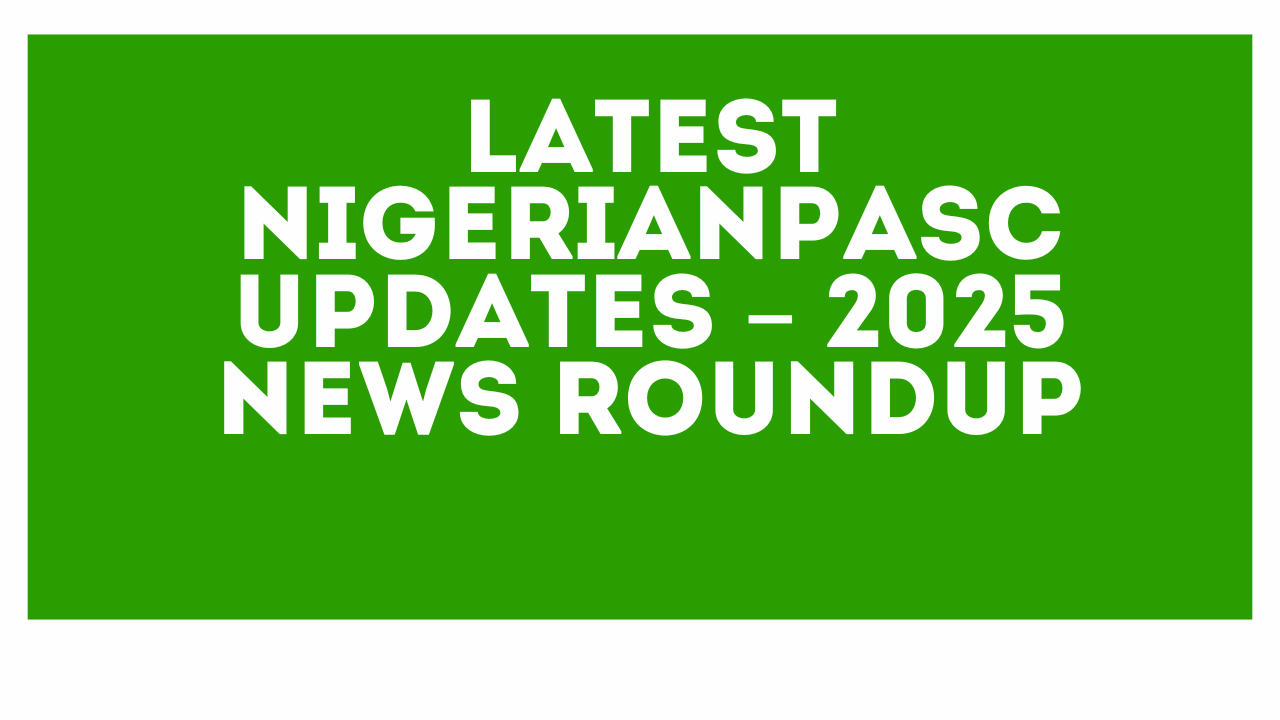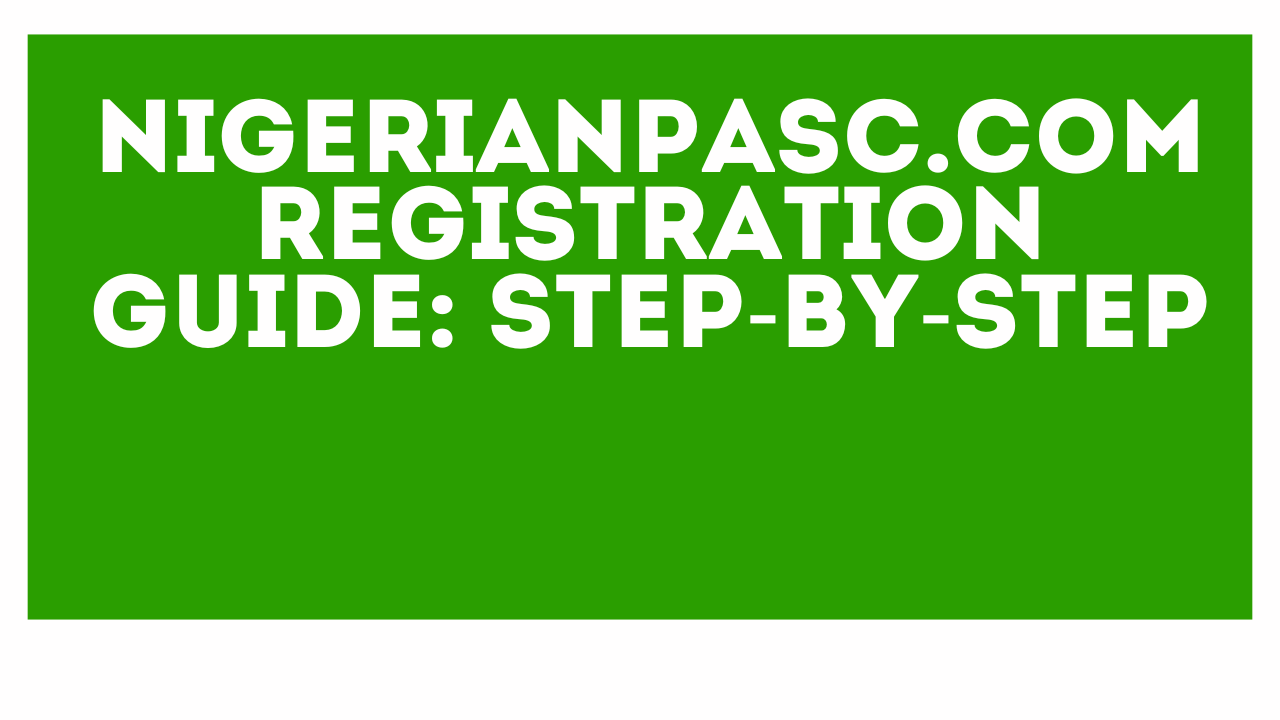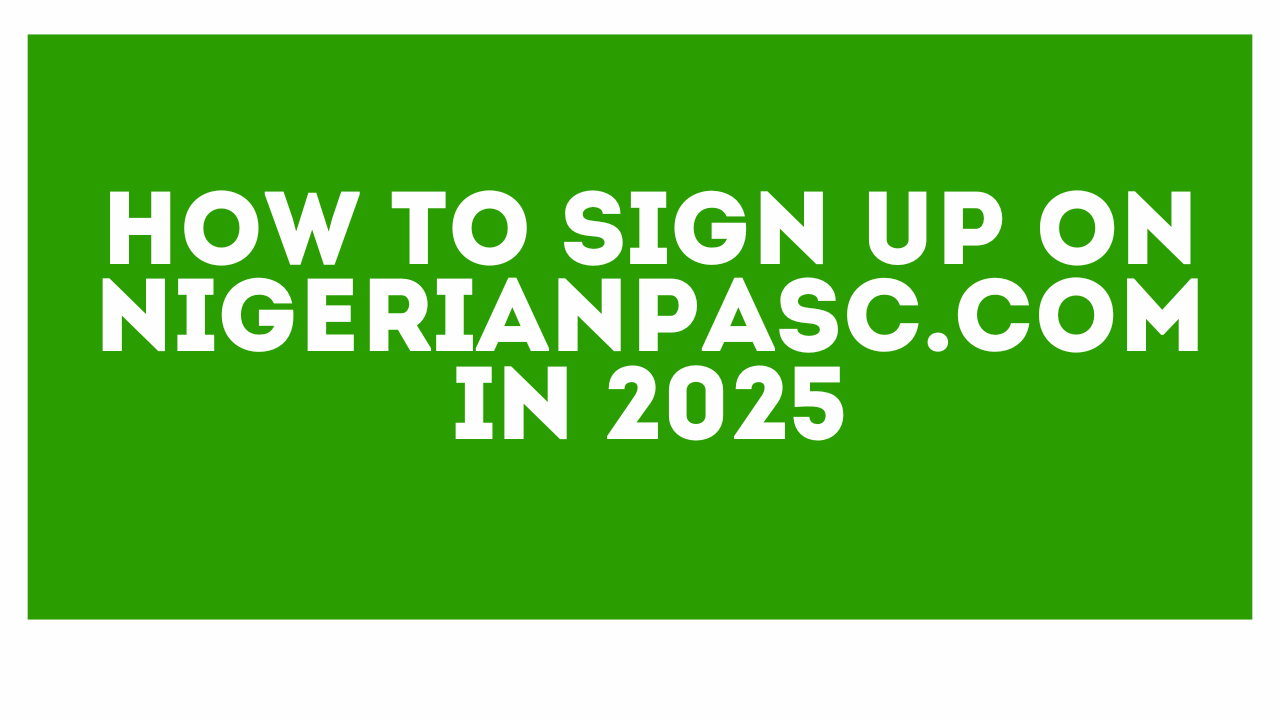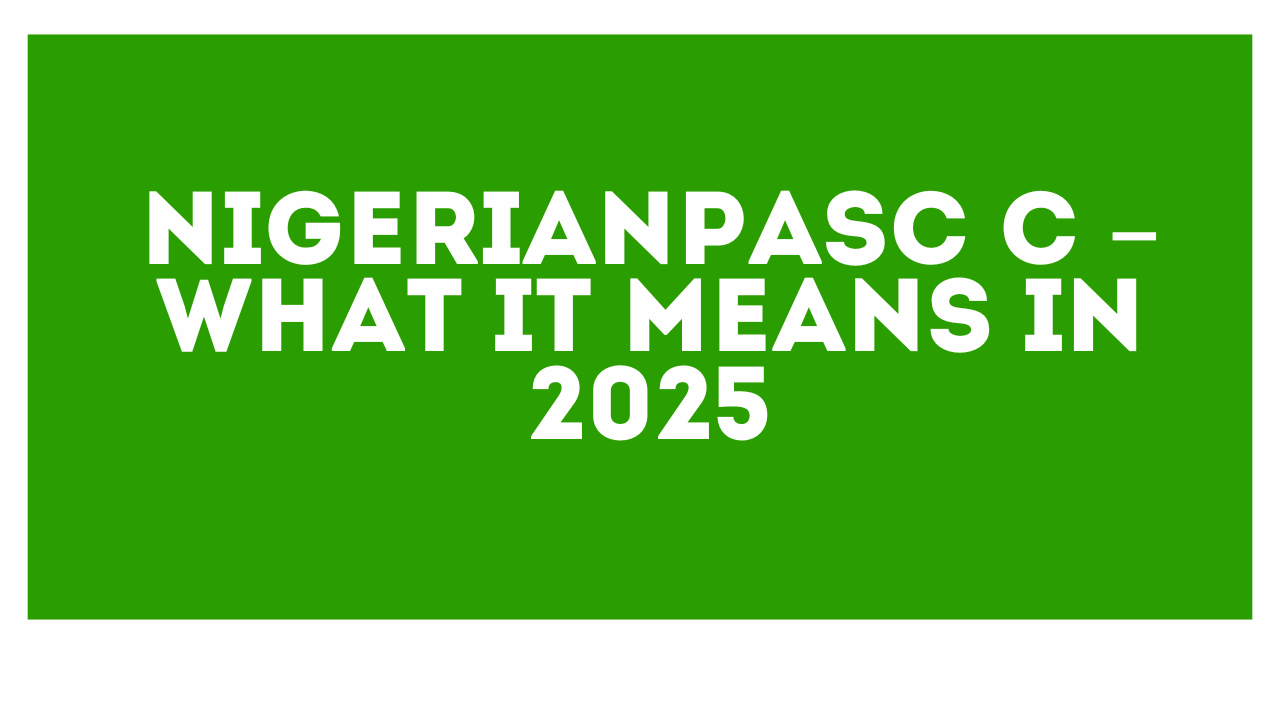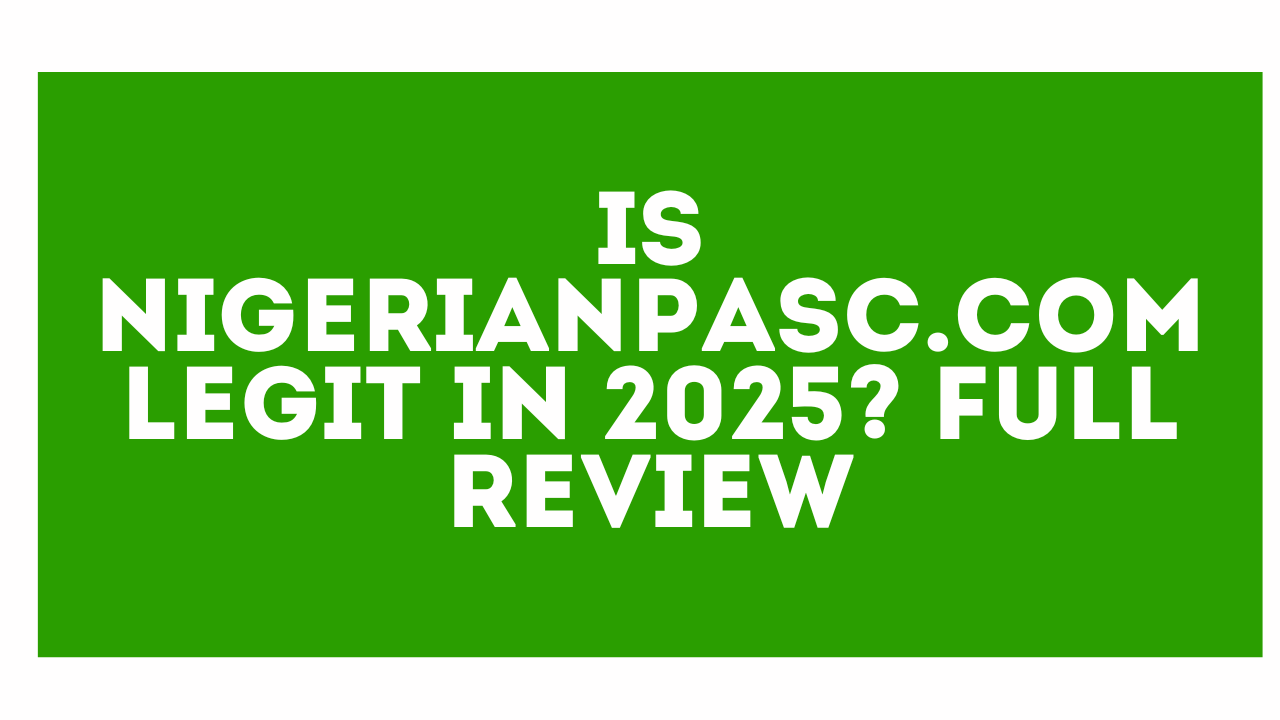Overview of Nigerian PASC Updates in 2025
Key Highlights
Nigerian PASC made significant strides in 2025.
These updates focus on enhancing agricultural practices.
The organization also emphasized sustainability and food security. Moreover, several partnerships emerged to boost productivity.
New Initiatives Launched
This year saw the launch of innovative initiatives.
One notable project aimed at improving irrigation techniques.
Additionally, training programs for local farmers were developed.
These programs target modern farming practices and technologies.
Policy Changes and Developments
Important policy changes were proposed in 2025.
The government aims to support local agricultural enterprises.
Furthermore, new regulations focus on sustainable practices.
These changes are expected to reshape the agricultural landscape.
Community Engagement Efforts
Engaging local communities became a priority this year.
PASC organized community forums to gather feedback.
These interactions fostered collaboration among stakeholders.
Moreover, they help identify pressing agricultural challenges.
Impact on Food Security
The updates positively impacted food security in Nigeria.
Increased awareness led to better resource management.
Furthermore, improved agricultural practices contributed to yields.
As a result, more communities accessed adequate nutrition.
Impact of New Policies on Educational Technology in Nigeria
Overview of Recent Educational Policies
The Nigerian government has introduced various policies aimed at enhancing educational technology.
These policies focus on improving access to digital resources in schools.
Additionally, they emphasize the need for updated training for educators.
Consequently, schools are encouraged to adopt new technologies.
Enhanced Access to Resources
New policies aim to bridge the digital divide in education.
They promote the procurement of tablets and laptops for students.
This initiative is expected to increase student engagement and learning outcomes.
Moreover, schools are encouraged to utilize online platforms for learning.
Professional Development for Educators
Training programs for teachers are a key component of these policies.
Educators are expected to gain skills in using digital tools effectively.
Additionally, ongoing workshops will provide updates on emerging technologies.
This focus on professional development enhances teaching methods.
Collaboration with EdTech Companies
The government is fostering partnerships with educational technology firms.
These collaborations aim to develop customized solutions for Nigerian schools.
Furthermore, local startups are being invited to contribute innovative ideas.
The goal is to create relevant and effective educational tools.
Increased Funding for Technology Integration
New policies include increased funding for technological integration in classrooms.
This funding supports the purchase of necessary equipment and software.
Additionally, schools can now apply for grants to enhance their tech infrastructure.
As a result, many institutions are beginning to modernize their facilities.
Challenges and Opportunities
Despite the advancements, challenges remain in implementing these policies effectively.
The lack of reliable internet access in rural areas poses significant hurdles.
Additionally, there is a need for continuous support and maintenance of technology.
However, by addressing these challenges, Nigeria can enhance its educational landscape.
Trends in Online Learning Platforms: A 2025 Perspective
Growth of E-Learning
The e-learning industry continues to expand rapidly.
More learners prefer online education over traditional methods.
This shift reflects a broader acceptance of digital learning.
Consequently, online platforms are updating their offerings.
Integration of Artificial Intelligence
Artificial intelligence is transforming online learning experiences.
AI personalizes learning by adapting to individual needs.
Moreover, it automates administrative tasks for institutions.
This technology enhances overall efficiency and user satisfaction.
Increased Focus on Accessibility
Access to online education is more vital than ever in 2025.
Organizations prioritize making content available to all learners.
This includes developing resources for those with disabilities.
As a result, more inclusive platforms are emerging.
Interactive Learning Environments
Future online learning platforms emphasize interactivity.
Gamification encourages student engagement and motivation.
Interactive simulations provide practical, hands-on experiences.
These innovations enhance retention and understanding of material.
Collaborative Learning Spaces
Online education increasingly features collaborative tools.
Students benefit from working together on projects remotely.
This fosters a sense of community and shared learning.
Additionally, social learning enhances knowledge retention.
Emerging Educational Technologies
Virtual and augmented reality are gaining traction in e-learning.
These technologies create immersive educational experiences.
Furthermore, they allow for real-world applications of theoretical concepts.
As a result, learners can engage in practical scenarios.
Integration of AI and Machine Learning in Nigerian Education Systems
Overview of Current Trends
Nigeria is increasingly adopting AI and machine learning in its education systems.
This shift enhances learning outcomes and improves teaching methods.
Schools are adopting software that personalizes learning experiences.
Additionally, educators are utilizing data analytics to improve student performance.
Benefits of AI in Education
AI provides tailored learning experiences for students.
It addresses individual learning styles and paces effectively.
Furthermore, it helps teachers identify struggling students quickly.
As a result, timely interventions can be implemented to support these students.
AI-Powered Learning Tools
Various AI-powered tools are emerging in Nigerian classrooms.
Platforms like Genie and EduTech are gaining popularity among teachers.
These tools facilitate interactive learning and engagement.
Moreover, they offer real-time feedback to students and educators.
Challenges in Implementation
Despite the benefits, challenges persist in integrating AI in education.
Limited access to technology affects many schools across Nigeria.
Additionally, some educators may lack the necessary training.
Finally, concerns about data privacy and security need addressing.
The Future of AI in Nigerian Education
The future looks promising for AI in Nigerian education systems.
With continuous investment, more schools will adopt innovative technologies.
Additionally, partnerships with tech companies can enhance resources available.
Ultimately, AI has the potential to revolutionize teaching and learning.
Challenges Faced by Educators in Adapting to New Technologies
Limited Access to Technology
Many educators struggle with limited access to essential technology tools.
This issue creates a significant barrier to implementing new teaching methods.
Additionally, schools in rural areas face even greater challenges.
Lack of Training and Support
Many teachers lack adequate training on new technologies.
This lack of training can lead to frustration and decreased effectiveness.
Furthermore, ongoing support is often limited after initial training sessions.
Resistance to Change
Some educators exhibit resistance to adopting new technologies.
This attitude can stem from a fear of the unknown.
Moreover, traditional teaching methods remain comfortable for many.
Time Constraints
Time is a significant obstacle for educators seeking to integrate technology.
Many teachers report feeling overwhelmed by their workloads.
Additionally, planning effective technology-enhanced lessons requires extra time.
Insufficient Infrastructure
Adequate infrastructure is crucial for successful technology integration.
Unfortunately, many schools lack the necessary bandwidth and equipment.
This situation often hampers both teaching and learning experiences.
Unequal Student Access
The digital divide affects students’ ability to access technology.
Some students lack reliable internet or devices at home.
This disparity can lead to inequities in learning opportunities.
Overcoming Challenges
Educators can overcome these challenges through collaboration.
Sharing resources can help bridge the technology gap.
Moreover, professional development programs play a crucial role.
Encouraging a culture of innovation within schools fosters adaptation.
Case Studies: Successful Implementations of EduTech Solutions in Nigerian Schools
Introduction to EduTech in Nigeria
The integration of EduTech in Nigerian schools has transformed education.
Schools are leveraging technology to enhance learning experiences.
EduTech solutions cater to various educational needs.
Innovative Platforms Enhancing Education
Several platforms have emerged to support Nigerian schools effectively.
Focus ed on providing interactive learning experiences.
- StudyHub offers personalized learning through adaptive content.
- TutorNG connects students with qualified tutors online.
- LearnAfrica provides digital resources and textbooks for students.
These platforms are improving access to quality education.
Successful Implementation in Lagos Schools
In Lagos, several schools have successfully implemented EduTech solutions.
For instance, Greenfield Academy adopted digital classrooms.
Teachers utilize smart boards for interactive teaching.
Students engage with content using tablets and apps.
This approach leads to improved student participation and performance.
Impact in Rural Areas
EduTech solutions are also reaching rural schools in Nigeria.
A notable example is the use of offline learning apps.
These apps allow students to access lessons without the need for internet.
Rural students are benefiting from mobile learning initiatives.
Assessment and Feedback Systems
EduTech has introduced effective assessment methods in Nigerian schools.
Digital assessment tools provide immediate feedback to students.
This encourages continuous learning and improvement.
Teachers can analyze student performance trends through data analytics.
Challenges and Considerations
Despite the successes, challenges remain in integrating EduTech.
Infrastructure and internet access are significant barriers.
Additionally, teacher training is essential for effective implementation.
Addressing these challenges will enhance the EduTech landscape further.
Future Prospects of EduTech in Nigeria
The future of EduTech in Nigeria looks promising.
Innovations will continue to shape the educational ecosystem.
Next, more partnerships will emerge between tech companies and schools.
These collaborations can lead to better resources for students and teachers.
Ultimately, EduTech has the potential to revolutionize education in Nigeria.
Comparative Analysis of Nigerian PASC Updates and Global EduTech Developments
Nigerian PASC Initiatives
Nigerian PASC focuses on integrating technology in classrooms.
The initiative promotes digital literacy for teachers and students.
Programs offer training to enhance teaching methods.
Specifically, PASC encourages the use of online resources.
Furthermore, it collaborates with universities for innovative projects.
This approach improves access to education across the country.
Global EduTech Trends
Globally, EduTech is rapidly evolving with new technologies.
Artificial intelligence is revolutionizing personalized learning experiences.
Many countries invest heavily in virtual reality for immersive education.
Moreover, mobile learning applications continue to gain popularity.
Educational institutions worldwide are shifting towards digital platforms.
Comparative Insights
Nigerian PASC updates lag behind global EduTech advancements.
However, Nigeria shows a growing commitment to technology in education.
While global trends emphasize immersion, Nigeria focuses on basic tech training.
Additionally, challenges like infrastructure affect Nigeria’s progress.
Nonetheless, there are notable successes in local partnerships and initiatives.
Future Prospects
Looking ahead, Nigerian PASC can learn from global best practices.
Incorporating AI could enhance the learning experience for students.
Improving internet access will be crucial for broader participation.
Furthermore, expanding teacher training programs can bridge gaps.
The potential for growth in Nigerian EduTech remains promising.
Future Outlook: Predictions for Nigerian Education Technology Beyond 2025
Emerging Technologies in Education
Artificial intelligence will play a crucial role in learning environments.
Educators can utilize AI for personalized learning paths.
Moreover, virtual reality will provide immersive educational experiences.
Students can explore historical events or scientific concepts interactively.
Additionally, blockchain technology will enhance credential verification.
This will increase transparency and authenticity in educational records.
Increased Access to Learning Resources
Online platforms will expand access to quality educational materials.
Remote learning will become more prevalent, especially in rural areas.
Furthermore, mobile devices will facilitate education anywhere and anytime.
Students can learn on-the-go through various applications and software.
Collaborative Learning Environments
Future classrooms will emphasize collaboration among students.
Project-based learning will encourage teamwork and problem-solving skills.
Peer-to-peer learning will become an integral part of education.
This encourages knowledge sharing and diverse perspectives.
Government and Private Sector Collaboration
Public-private partnerships will prop up educational technology growth.
Investment from private companies will enhance infrastructure and resources.
Additionally, governments will implement favorable policies to support innovation.
This collaborative effort will drive significant advancements in education.
Focus on Lifelong Learning
The future of education will prioritize continuous learning opportunities.
Adults will seek professional development and reskilling programs.
Moreover, micro-credentials will gain importance in job markets.
This shift will ensure individuals remain competitive in evolving industries.
